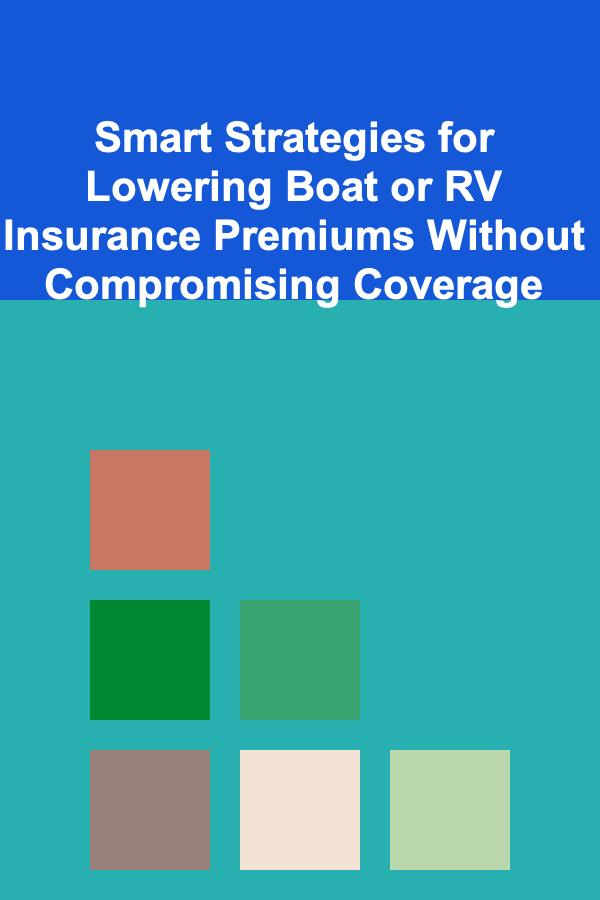
Smart Strategies for Lowering Boat or RV Insurance Premiums Without Compromising Coverage
ebook include PDF & Audio bundle (Micro Guide)
$12.99$11.99
Limited Time Offer! Order within the next:

Insurance premiums for boats and RVs can be a significant part of owning these vehicles. However, while it's essential to ensure you have adequate coverage, there are various strategies that can help you lower your insurance premiums without sacrificing the quality of protection. This actionable guide will provide practical steps and insights to help you strike the perfect balance between saving money and maintaining the necessary insurance coverage for your boat or RV.
Shop Around and Compare Quotes
The first step to lowering your insurance premiums is to shop around. Insurance companies often vary in their pricing, coverage options, and discounts. Even small differences in premiums can lead to substantial savings over time.
Actionable Tips for Shopping Around:
- Get Multiple Quotes: Don't settle for the first quote you receive. Get quotes from at least three or more insurance companies. Each company uses different algorithms and risk models to determine pricing.
- Look Beyond the Big Names: While well-known companies are trusted, smaller or niche insurers often offer competitive rates for boats and RVs. They may specialize in these types of vehicles and could provide tailored coverage options.
- Consider Bundling Insurance: Many insurers offer discounts if you bundle your boat or RV insurance with other policies, such as auto or home insurance. This can lead to significant savings.
Review and Adjust Your Coverage Limits
While it's essential to have sufficient coverage, you might be paying for limits you don't need. Review your policy to ensure that you're only paying for the coverage you actually require.
Actionable Tips for Adjusting Coverage Limits:
- Assess Your Vehicle's Value: For older boats or RVs, consider adjusting your coverage limits to reflect the current market value. If your boat or RV has depreciated, you might not need as much coverage as you initially thought.
- Liability vs. Comprehensive Coverage: Ensure you're balancing the right types of coverage. If you primarily use your RV or boat in low-risk areas or only during specific seasons, you may not need full comprehensive or collision coverage.
- Deductible Adjustments: Consider increasing your deductible. A higher deductible typically lowers your premium, but make sure you can comfortably cover the deductible amount if you need to file a claim.
Maintain a Good Driving and Claim History
Insurance companies take your driving and claims history into account when determining premiums. Maintaining a clean record can lead to significant savings on your insurance premiums.
Actionable Tips for Maintaining a Good Record:
- Safe Driving: For RV owners, avoiding accidents or traffic violations while towing is essential. Boaters should follow maritime safety guidelines to avoid accidents or infractions.
- Accident-Free Discount: Many insurers offer discounts for accident-free records. Even if you've had a claim in the past, maintaining a clean record going forward can reduce premiums over time.
- Report Claims Efficiently: When you do need to file a claim, do so promptly and accurately. Being a responsible policyholder can ensure that your insurer views you as a lower-risk client, which may lead to lower premiums.
Store Your Boat or RV Securely
The location where you store your boat or RV plays a key role in determining your insurance premiums. Vehicles that are stored in secure, low-risk areas are less likely to be damaged or stolen, which can result in lower premiums.
Actionable Tips for Secure Storage:
- Store Indoors or in a Covered Facility: Boats or RVs that are kept in garages, storage units, or covered areas are generally cheaper to insure than those left outside. Many insurers offer discounts for vehicles stored in secure locations.
- Install Security Systems: Adding GPS tracking devices, motion detectors, or alarms can reduce the risk of theft and damage. Insurers often reward these additional security measures with lower premiums.
- Use a Locking Mechanism: For boats, using a locking device on the trailer or storage area can reduce the chances of theft. Similarly, using a wheel lock or hitch lock for an RV can lower the likelihood of theft, which could result in a discount on your premium.
Consider the Seasonality of Your Usage
Boat and RV owners often use their vehicles seasonally, and paying for full-year coverage when you're not using them might not be the most cost-effective option.
Actionable Tips for Seasonal Adjustments:
- Seasonal Coverage: If you only use your boat or RV during certain months, ask your insurer about seasonal or part-time coverage options. This allows you to reduce your premiums during the off-season.
- Uninsured or Comprehensive-Only Coverage: For the months when your boat or RV is stored away and not in use, you may only need basic comprehensive coverage. This can significantly lower your premiums compared to full coverage year-round.
- Temporary Coverage: If you're planning on a long trip or using your RV for a particular season, you might be able to opt for temporary or short-term insurance coverage, which could be more cost-effective than paying for full-year coverage.
Take Advantage of Discounts
Insurance companies offer a wide range of discounts that you might not be aware of. Taking advantage of these discounts can substantially lower your premiums while ensuring you're still properly covered.
Actionable Tips for Finding Discounts:
- Multi-Vehicle Discounts: If you insure more than one vehicle, you could be eligible for a multi-vehicle discount. For example, insuring both your RV and boat with the same provider could result in savings.
- Safety Course Discounts: Many insurers offer discounts for policyholders who complete safety courses. For boaters, completing a boating safety course or for RV owners, an RV safety course, may result in premium reductions.
- Low Mileage Discounts: Some insurance companies provide discounts for low-mileage RV owners who don't use their vehicles frequently. If you don't take long trips or your boat is used only occasionally, this discount could apply.
- Loyalty Discounts: Long-term policyholders may qualify for loyalty discounts. Staying with the same insurer for several years can demonstrate to the company that you're a low-risk client.
Increase Your Policy's Visibility
Making sure your insurer knows the details of how you use your boat or RV can sometimes lead to discounts or a more customized policy. Ensuring that the insurer has an accurate understanding of your vehicle's use helps them offer the best possible deal.
Actionable Tips for Policy Transparency:
- Detailed Information: Be specific about your boating or RV activities. If you use your boat in low-risk areas, or your RV is mainly parked at home, make sure this is noted in your policy. This could help lower premiums.
- Use of the Vehicle: If you're using your boat or RV for leisure or pleasure and not for commercial purposes, this should be clearly indicated in your policy to avoid paying for unnecessary commercial coverage.
- Clarify Usage Patterns: Insurers may offer discounts for limited use, such as using the boat for short trips or an RV that remains in one place for long periods. The more accurate your information, the more likely it is you'll receive the best rates.
Evaluate Your Insurance Deductibles
Your deductible plays a significant role in your premium. A higher deductible means lower premiums, but you must ensure you can afford to pay the deductible if you need to make a claim.
Actionable Tips for Managing Deductibles:
- Higher Deductible: Increasing your deductible can lower your premium significantly. However, make sure that the deductible is still affordable for you in the event of an accident or damage.
- Compare Deductibles: Compare the difference in premiums between various deductible levels. In some cases, increasing your deductible just slightly can result in a significant drop in your premium.
Conclusion
Lowering boat or RV insurance premiums without sacrificing coverage requires a combination of strategic adjustments and smart decisions. By shopping around for the best quotes, adjusting coverage limits, maintaining a good driving record, securing your vehicle, and taking advantage of discounts, you can achieve the right balance between cost and coverage. Understanding your insurance needs and being proactive in managing your policy can lead to substantial savings, while still keeping your boat or RV properly insured.
Reading More From Our Other Websites
- [Mindful Eating Tip 101] How to Turn Everyday Grocery Shopping into a Mindful Eating Experience
- [Beachcombing Tip 101] How to Safely Transport Fragile Beachcombing Finds in a Shock‑Absorbing Backpack
- [Beachcombing Tip 101] Eco-Friendly Beachcombing: What to Look for (and What to Leave Behind) for a Sustainable Coast
- [Biking 101] Top 5 Bike Chains for Durability and Performance
- [Tiny Home Living Tip 101] Best Legal Considerations and Zoning Tips for Tiny Home Placement
- [Personal Care Tips 101] How to Follow a Hair Care Routine for Strong and Lustrous Hair
- [Metal Stamping Tip 101] How AS9100 Certification Boosts Aerospace Metal Stamping Contracts
- [Organization Tip 101] How to Organize Your Digital Craft Resources
- [Organization Tip 101] How to Set Up a Multi-Functional Fitness Area
- [Organization Tip 101] How to Store Napkins and Table Linens Neatly

How to Clean and Organize Your Pantry to Maximize Space
Read More
How to Create a Digital Marketing E-book: A Step-by-Step Actionable Guide
Read More
How to Plan a Memorable Home Cocktail Party
Read More
How to Use Clear Bins for Easy Craft Supply Storage
Read More
Mastering Community Management: Essential Skills for the Modern Community Manager
Read More
How to Navigate the Design Process: A Guide for Industrial Designers
Read MoreOther Products

How to Clean and Organize Your Pantry to Maximize Space
Read More
How to Create a Digital Marketing E-book: A Step-by-Step Actionable Guide
Read More
How to Plan a Memorable Home Cocktail Party
Read More
How to Use Clear Bins for Easy Craft Supply Storage
Read More
Mastering Community Management: Essential Skills for the Modern Community Manager
Read More